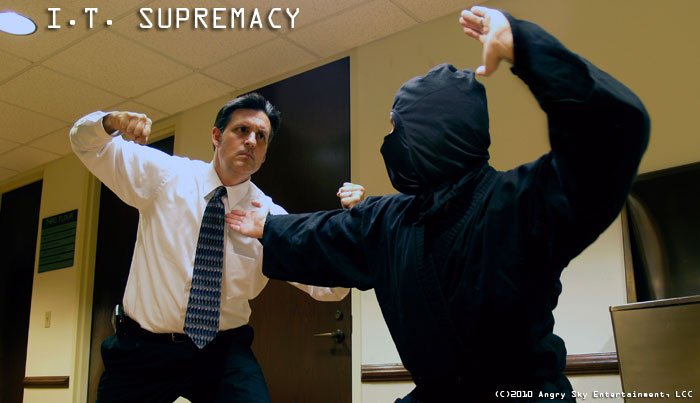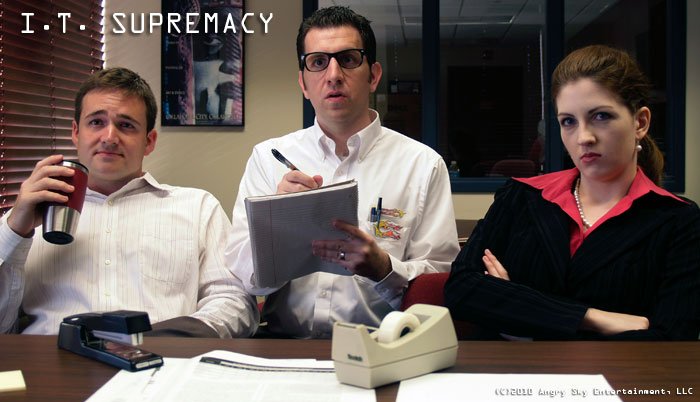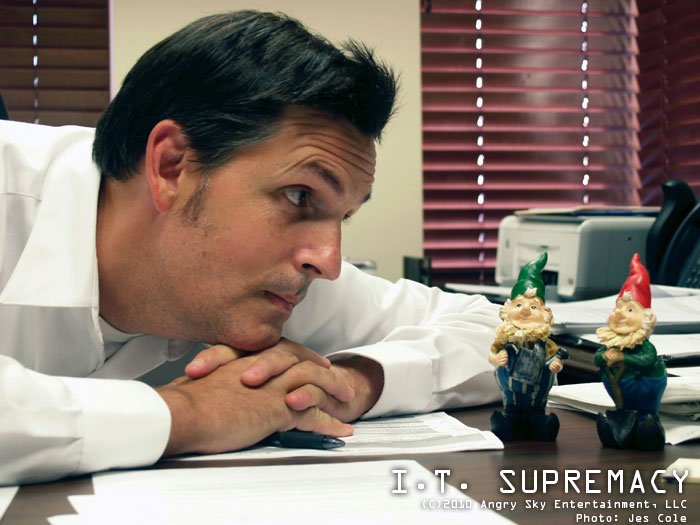
I.T. Supremacy
Jay Galvin, Composer for I.T. Supremacy
Interview with Composer Jay Galvin
Jay Galvin, the composer and actor from I.T. Supremacy, joins us for an exclusive interview!
Jay Galvin, thank you for joining us today! Tell us a little about I.T. Supremacy. What is the concept for this movie?
I.T. Supremacy takes the documentary styles of comedy and action to the next level. Not to sound too cliché, but it’s like The Office meets the Bourne Trilogy.
You were involved at many levels in I.T. Supremacy, and audiences will recognize you immediately in the movie as Leonard. What kind of character is Leonard and what were your inspirations for playing him?
Leonard is the ultimate bad guy. He is mean, but you can’t quite figure out why. Having served in the U.S. Marine Corps, I modeled the sinister behavior for Leonard’s character after a particular Drill Instructor I had in boot camp. Leonard thinks that no one can do their jobs well enough to deserve his kindness, if he has any.
What was the biggest challenge in playing Leonard?
The hardest part is the amount of energy that has to go into playing a bad guy. I guess I have some of that human nature somewhere inside of me, but it takes a lot of concentration to be able to focus it into one character. Ultimately, the biggest challenge was when my family finally got to watch the movie with me. I didn’t expect to be so nervous when my parents and my sisters sat there and watched me be a jerk for most of the movie.
Do you have any favorite Leonard moments?
My favorite Leonard moment is when you finally see him blow his top. There’s something fun about performing multiple takes of which is mostly just yelling in frustration.
Without giving too much away, there are some pretty high-octane action sequences in this movie. What was your role in the action segments?
Let’s just say that I was pretty tired after shooting the action scenes… and sore.
And you also were involved with the fight choreography?
Yes. We basically storyboarded the fight scenes before shooting to give us an idea of what to shoot and how to shoot it. There was a piece of paper with things like “whizzer block to cross,” and “right knee, sweep leg.” This helped keep the fight scenes going more smoothly.
How did you approach the fight choreography? Are there any particular styles you used?
It was fun working with Chris [White] because of his Jujitsu experience and we definitely utilized a lot of Jujitsu in our fight, but for the rest, I studied up on Ninjitsu and ultimately drew from my experience in kickboxing, Jeet Kune Do, and the Marine Corps Martial Arts Program. I really wanted it to look real, as if a documentary camera were capturing a real fight.
Do you have any favorite fight moments?
I love the part where Jim and the Ninja have their little showdown and the Ninja has his only bit of dialogue, if you can even call it that. There is also a part when Chris puts the Ninja in an arm bar and I kid you not, the arm breaking sound is not an effect. It is actually my elbow popping, but it’s ok, it didn’t actually hurt.
Of course, you also composed all original music for I.T. Supremacy. When did you start studying music and composing?
I started guitar lessons when I was 8 years old and wrote my first song when I was 13. After that, it’s kind of a blur. I got my degree in music at the University of Oklahoma where I met Ken Cole. I composed and performed the guitar stuff for Tornado Glory and now the full score for this. Fortunately, when we work together, the results are amazing.
Who are your favorite composers?
My favorite composers also include improvisers and performers: Bach, Mozart, Beethoven, Liszt, Debussy, Ravel, Thelonius Monk, Herbie Hancock, Dave Brubeck, Miles Davis, Elvis Presley, Jimi Hendrix, Stevie Wonder, Michael Jackson, Paul Simon, and the list goes on!
What was your goal for the music in I.T. Supremacy?
The point was to take all Hollywood action movie music and condense it down into its basic elements. Of course, there was a deliberate homage to John Powell’s work on the Bourne series, but I wanted to make it more than that. I wanted it to have its own flavor, but still sound just like those kinds of movies.
From your experience composing, is it tricky doing music for a parody?
When doing music for a parody, there’s not a lot of room for personal creativity. There is a certain mold that you have to fit in for the most part. Finding the room for creativity is a challenge that I particularly enjoy. I found my respect for this style grew as I immersed myself in it. To avoid the pitfalls, it was best to look toward the desired outcome and find what best portrayed it. I guess that’s why they say, “good composers borrow, great composers steal.” There’s a reason why it worked so well the first time. The music enhances the comedy inherent in the parody. It is never really about the composer, but rather the parody itself and utilizing the music that best portrays it.
What do you think about spoofs in general? Do you have any favorites?
Spoofs are great. They give us an opportunity to pay our respects to the greats. I like anything by Mel Brooks: Spaceballs, Robin Hood: Men in Tights, and Young Frankenstein to name a few.
How is I.T. Supremacy different from your previous projects?
I.T. Supremacy was my chance to work with the audio, effects, music, and dialogue in a way that I hadn’t had the luxury in past projects. Having control over all the aspects of post production with the sound was a huge task and required me to wear many different hats. Now that I’ve experienced it, I look forward to many more projects.
Do you have any projects coming up that you can tell us about?
I don’t know… Can I talk about the possibility of a high intensity sequel to Tornado Glory? I hope so!!







